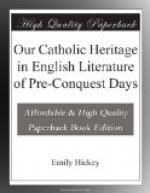[Illustrations: SAXON SHIP As used by our Forefathers in the time of King Alfred
THE ALFRED JEWEL
[Page 114]
Robert Bruce Cotton was another great book-collector. His library was sold to the nation about seventy years after his death. Many books and MSS. belonging to it were destroyed or injured by a fire that broke out where it had been placed; among those injured was the only copy of the old poem of Beowulf, which I have not talked about because it is apparently outside our Catholic Heritage in literature. The reduced library is now at the British Museum. It includes the beautiful Lindisfarne Gospels, or Durham Book, which once belonged to Durham Cathedral.
There is another collection which was bought for the British Museum, made by Harley, Earl of Oxford.
William Laud, who was Archbishop of Canterbury in Charles the First’s time, and, like him, died on the scaffold, was also greatly interested in collecting books. He gave generously to Oxford University, and his books are in the Bodleian Library, with many other valuable literary treasures.
Francis Junius collected Anglo-Saxon literature, and other books. He left them to the Bodleian Library. Among them is the unique “Caedmon” Manuscript, given him by Archbishop Usher, who founded the library of Trinity College, Dublin. People are now alive to the value of these great possessions, and we must be glad that scholars have worked at them, and published many of them, and so made their contents accessible to everyone. But we must never forget our debt to the earliest writers, and chiefly to the monks who wrote and who copied, much and long and well. As we trust, they have their reward.
There are two specially interesting collections of manuscript Anglo-Saxon poems, known respectively as the Exeter Book and the Vercelli Book. The Exeter Book is one of some sixty volumes acquired by Leofric, Bishop of Crediton, when he was making his library for the cathedral of his new bishopric at Exeter. It is described as “a large English book of many things wrought in verse.” It is one of the few of Leofric’s books that remain at Exeter, where it has been over eight hundred years. It contains various poems by Cynewulf and others. Several leaves are missing, and ink has been spilt over part of one page. This Exeter library was scattered at the “Reformation.” Some of its treasures are in the Bodleian Library at Oxford, or at Corpus Christi College, at Cambrige.
The Vercelli Book is so called because it was discovered in its home in the cathedral library at Vercelli in Italy a good many years ago. It contains twenty-two sermons in Anglo-Saxon, and six poems, among which is our beautiful “Dream of the Holy Rood.” Perhaps some English pilgrim or pilgrims, on the way to Rome, left this book as a gift, or through inadvertence, at the hospice where hospitality had been received. Or perhaps Cardinal Guala, who was over here in the days of John and of Henry III, bought the book for his library at Vercelli. Or perhaps it was one of the books of which John Bale tells us whole ships-full went abroad. We have to be very grateful to the scholars whose researches have recovered for us so much of our old heritage, and to those who have made their contents in various ways so easy to get at.




